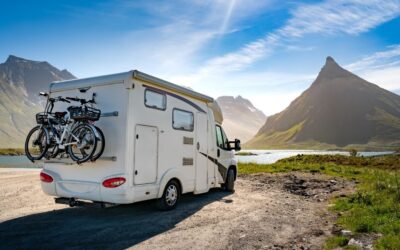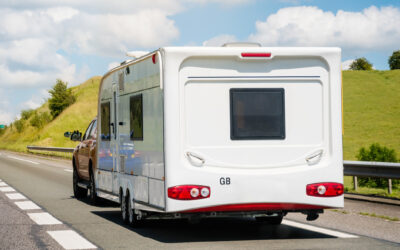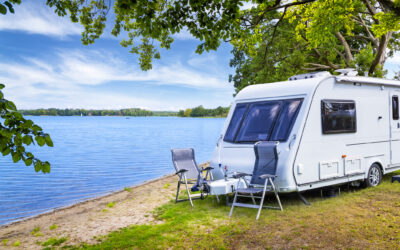Winterisation: Preparing your caravan or motorhome for storage
Unless you plan on touring year-round, there are certain things you’ll need to do to keep your caravan or motorhome protected through the winter. Here are Wrapper’s top tips on winterisation…
As the nights begin to draw in, the season starts to wind down and the air takes on an altogether nippier chill, it’s time to think about getting your caravan or motorhome ready for the winter. Because if you want to be able to simply fire up and go again come the spring, you’re going to need to take every precaution to protect your rig against the cold. The last thing you want to discover when you take your caravan or motorhome out of storage next year is that you need to fix cracked pipes and damp bodywork before you can hit the road.
Drain the water system
Any water left in your system when the temperature drops below zero can cause you all sorts of headaches – and expensive ones at that. Water expands as it freezes, and even the smallest amount left in your fresh or waste water systems over winter could cause your pipes to crack or burst. That’s not an issue you want to have to deal with as the season gets underway again in the spring. To get every last drop out of your system you might want to think about investing in a drain-down kit like the Floe, which will make the process relatively painless. But many others prefer to do it manually.
The best way to do this is to make sure all taps, toilets and showers are completely drained – and be aware that even when you think you’ve done just that, there’s likely to still be water lurking somewhere. You can get another litre out of the system by turning off all the taps, taking the head off the shower and blowing down the shower hose. Open all the taps again afterwards, and then consider pouring a bit of anti-freeze (diluted to the appropriate solution) down the kitchen and bathroom plugholes to stop any remaining drops from freezing. It might also be a good idea to remove the water filter, because even the residual water trapped in there can freeze, splitting the filter.
Do some damp-proofing
Anyone who’s ever opened up their caravan or motorhome after it’s been in storage for a few months will know that musty smell that seems to penetrate every square inch. It’s the telltale scent of damp and is the arch-enemy of caravan and motorhome owners across the world. That’s because repairing the damage caused by damp is not only difficult, it can be extremely expensive. So it’s important to do everything you can to protect your vehicle against it before the winter strikes.
The easiest thing you can do is to make sure your caravan or motorhome is completely dry before you lock it up for the winter, and to make sure it is well ventilated while in storage. Think about wiping down all showers and sinks, open all internal doors and cupboards, and unblock airways and grates. You could also consider removing all cushions and mattresses (or at least standing them on end), as these can be magnets for moisture.
If you’re keeping your caravan or motorhome parked up at home, consider keeping the electricity connected and allowing the central heating to kick in and run from time to time. Or invest in a portable heater that comes on automatically either at set times or when the temperature drops below a certain point. These can be purchased and run fairly cheaply, and combined with good ventilation will help keep damp at bay.
Those storing their vehicle away from home might want to look into a greenhouse heater, as these are designed to be left on permanently and have a low heat output, making them much safer (and cheaper) to run than other portable heaters.
Dehumidifiers might also help tackle condensation build-up, which can lead to damp, but they are often prohibitively expensive to run. Most caravan and motorhome accessory shops will sell moisture-trapping kits like the Kilrock Moisture Trap, which are effective and affordable alternatives and are well worth exploring.
Protect against the elements
Whether you’re storing your caravan or motorhome at home or on a dedicated storage site, protecting it against rain, snow and high winds is a must. If you don’t or can’t have a caravan porch, a waterproof cover is the best way of protecting your vehicle’s bodywork through the winter. Bear in mind that if you do buy a cover, it’s vital to ensure it fits your vehicle properly and that it’s made of a waterproof but breathable fabric. A plastic cover that isn’t breathable will lead to a build-up of condensation between the inside of the cover and the bodywork, and that can cause damp – which is exactly what you’re trying to avoid.
Look after wheels and tyres
Keeping your caravan or motorhome sat in one position for weeks (or months) on end can cause tyres to become warped or cracked, and you won’t want to have to invest in a new set every spring. Luckily, there are some easy preventative steps you can take to stop this from happening. The first thing to do is to ensure all tyres are correctly inflated, and then check the pressure every 8 weeks or so. This will set you up safely for the easiest step, which is to periodically move your vehicle throughout the winter to ensure there’s some kind of rotation between the area of the tyre that’s in prolonged contact with the ground. If you’ve got a motorhome, moving it periodically will also help keep the engine in good condition, and will allow you to spot and fix any problems with it – or, more likely, the battery – before the new season gets underway.
‘Tyre savers’ and wheel covers are another good way of protecting the tyres and brake disks of your motorhome and can prevent any corrosion in those all-important areas. For extra peace of mind, you could even spray the chassis, brake disks and springs with a rust inhibitor.
For caravan owners, ‘winter wheels’ are another option to consider, especially if you’re not in a position to easily access and move your caravan while it’s in storage. These square metal holders are designed to completely replace your wheels, meaning they can be stored safely elsewhere. They also have added security benefits, as it makes your caravan impossible to tow away.
Clean against critters
A sheltered spot with a food supply is a tempting prospect for mice and other little critters looking for somewhere cosy to spend the winter, so making sure there is no food left inside your caravan or motorhome will help deter wildlife. Even the smallest crumb will attract rodents, so be sure to give all food preparation surfaces and cupboards a good, thorough clean before you park your vehicle up for the winter.
It’s a good idea to give the outside of your vehicle a similar clean and to apply a protective wax or polish to help protect the bodywork against the elements, especially if you’re not going to be using a cover. Autoglym and Fenwick’s offer a good range of products that can help repel water and dirt.
Security
It goes without saying that you’ll need to make sure all doors and windows are locked over the winter, but you’ll also need to ensure any security devices declared on your insurance policy are switched on and kept in full working order. If you’ve got a tracker or alarm that uses battery power, you’ll either need an external power supply or to make sure your leisure battery is regularly charged. A good solution here is to install a solar panel in the front window of your caravan or motorhome and connect it to the battery to trickle charge it through the winter.
If you don’t need a power supply throughout the winter, make sure everything is turned off and bring your battery into the house so you can easily keep it on a trickle charge, which will ensure it’s in top condition and ready to go in the spring. Remember not to store your battery on a cold concrete floor though, as this could damage it.
Gas bottles should also be removed and stored elsewhere, and associated taps turned to the closed position while your vehicle is in storage.
And there you have it: everything you need to know to effectively winterise your caravan or motorhome. Follow these steps and your vehicle will be in tip-top condition when you’re ready to hit the road again in the spring.
Of course, even with the best will and the most thorough preparation in the world, disaster can still strike, and in those cases your insurance will be invaluable. For full cover and peace of mind, check out Wrapper’s range of touring caravan and motorhome policies.
Recent Posts
- Pop the Champagne! Wrapper Insure wins at Insurance Times awards December 17, 2022
- On the road again: Preparing your motorhome or caravan for the season ahead December 2, 2022
- 5 things to do if your motorhome or caravan is stolen November 14, 2022





